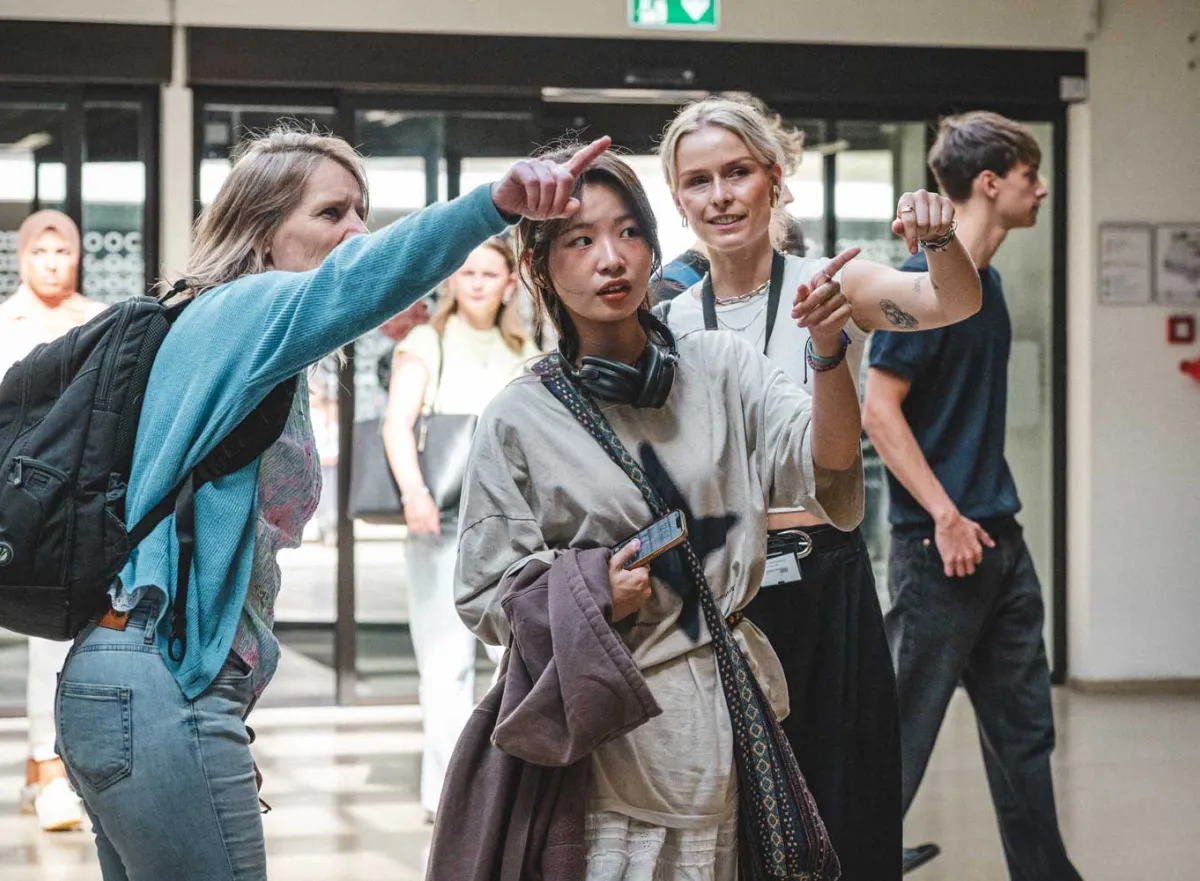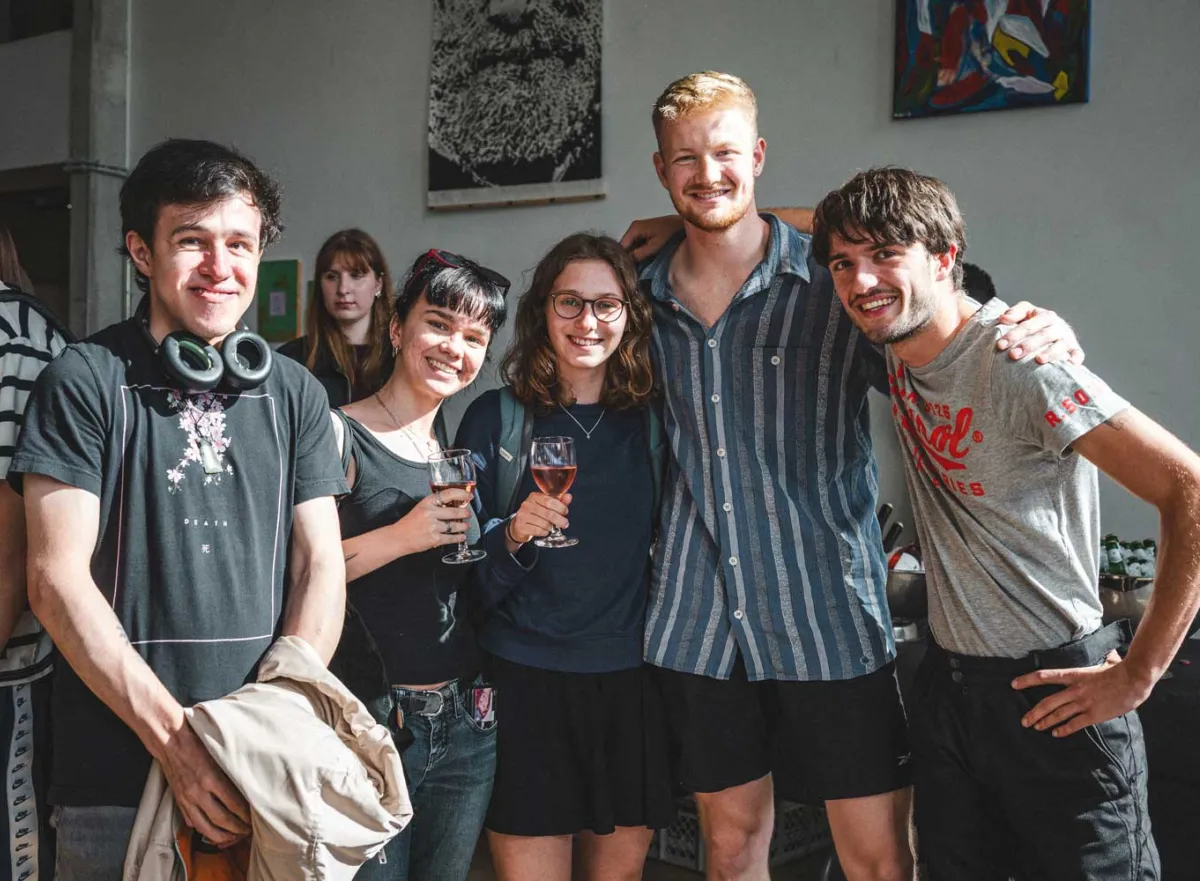Exchange programme
- Join this English-taught exchange programme in Antwerp, a lively start-up hub at the heart of Europe.
- Develop your own start-up strategy, from business model design to achieving product–market fit.
- Strengthen your skills in strategic marketing, international business law, supply chain basics and brand reputation.
- Benefit from practice-based learning with input from the Flemish Agency for Innovation and Entrepreneurship and the KdG Entrepreneurs Centre.
- Join for the autumn semester and earn 30 credits.
- Connect with like-minded students from across the globe and turn your ideas into viable ventures.
Interested in a full bachelor programme? Discover our bachelor in International Entrepreneurship.
More questions?
incoming.mit@kdg.be
What does this course contain?
Course in brief
This exchange programme immerses you in entrepreneurship, marketing and international business, giving you the tools to turn ideas into viable ventures.
- Build your start-up strategy: from understanding the “why” behind a business to designing business models and achieving product–market fit.
- Master strategic and operational marketing, including SOSTAC planning, market segmentation, product & brand strategy, pricing and communication.
- Learn international business law and trade practices, covering contracts, intellectual property, competition law and GDPR.
- Explore brand reputation: develop business and personal branding, crisis management, and brand architecture.
- Gain practical skills in supply chain basics, HRM and innovation management.
- Choose electives such as AI in practice, storytelling, or international business practices to tailor your learning.
- Apply your knowledge in hands-on projects and real-life cases, supported by guidance from entrepreneurs and innovation experts.
Course overview
- You can register for a minimum of 20 credits and a maximum of 33 credits per semester.
- To shape your individual exchange study programme, please contact us at incoming.mit@kdg.be.
Mandatory courses
Strategic and Operational Marketing
(
3 credits
)
SOSTAC Strategic Marketing Planning
- Foundations of Strategic Marketing
- Marketing decision-making and case analysis
- Opportunity analysis, market segmentation and market targeting
- Product and service strategy and brand management
- Integrated marketing communication strategy and management
- Marketing channel strategy and management
- Pricing strategy and management
- Marketing strategy reformulation: the control process
- Comprehensive marketing programs
Trade and Supply Chain Practicalities
(
3 credits
)
- Supply chain:
Introduction to SCM
Forecasting
Inventory management
Warehousing basics - Import and export management:
Terms of delivery: Incoterms®
Instruments of payments
Payment of short term transactions
Documents in international trade
Financing of international transactions
International Business Law
(
5 credits
)
- Legal and Illegal Advertising
- Company Structures
- Intellectual Property Rights: Trademarks, Design Rights, Patents and Copyright
- International Sales Contracts
- Other contracts: Licensing and Franchising, Agents and Distributors
- Competition Law
- General Data Protection Regulation (including Consumer Protection)
Start-up Strategy
(
4 credits
)
- You will learn how to analyse the "why" of a company or Why companies exist, and how to analyse vision statements and formulate a compelling vision yourself.
- We will dig into who you need to achieve this strategy and how to reach out to people. In support of executing a strategy, we will also cover basic market research techniques to validate strategic assumptions.
- You will learn how to set up different canvasses used for business model creation and how these could help in analysing existing models or in creating new models.
- We will discuss multiple frameworks to validate if you are maintaining the right course that was defined in your strategy.
- All subjects serve the overarching goal of understanding how to get from 'this is a nice idea' towards product market fit.
Brand Reputation
(
4 credits
)
- Brand & Reputation
You identify the differences between branding and reputation and how these two are linked. - Business and Personal Branding
You discover the pros and cons of business and personal branding and how to apply it to your strategy - Principles of Reputation
You identify the key concepts of Reputation, and how these impact in your brand - Issues and Crisis Management
You learn about crisis management concepts and cases, and the importance to think ahead to be prepared in case your brand experience crisis and how to react to it. - Brand architecture
You identify and create the pillars of your brand to construct a strong identity - Brand Reputation Strategy
You assemble the pieces of the puzzle and implement the essential elements of your brand to create your brand reputation strategy
Electives
International Business Practices
(
3 credits
)
- Relevant macroeconomics, politics and institutions
- Economic and political factors that affect doing business internationally
- Effects of cultural differences on global business: social aspects, formal and informal protocol, management practices, business traditions, values, negotiations, ...
- US-China trade relations and the repercussions for the EU
Corporate life
Storytelling as a Business Tool
(
3 credits
)
- Storytelling and content marketing
- Storytelling and social media context
- Mindset and basic requirements for storytellers
- The function and the elements of a story
- Storycrafting versus story delivery
- CAST model as a basis for solid storytelling
- Research-crafting-editing as a process
AI in Practice
(
3 credits
)
No previous knowledge or credits required. However, this course is theoretically and practically demanding; deep engagement with the course materials and assignment is a must.
Non-exhaustive list of topics:
- Introduction to AI
- Prompt engeneering
- Different AI models and tools in practice
- AI business opportunities
- Ethical considerations and legal framework
Human Resources Management
(
3 credits
)
- HRM from a business perspective:
- brief historical overview of HRM
- HR strategy and goal setting
- Ulrich's HR model
- Link with company vision, mission, values & strategic objectives
- Talent@work and employee experience:
- workforce planning
- employer branding
- competence and talent management
- sourcing, selection and recruitment
- on-boarding
- performance management
- learning & development
- Reward
- Off-boarding
Language course (optional)
Dutch Foreign Language for Beginners
(
3 credits
)
This course will help you to develop your skills in Dutch, the language spoken in the Netherlands and in Flanders. The learning objective is to reach level A1 of the CEFR for languages: understand and use familiar everyday basic phrases, introduce yourself and others, interact in a simple way provided the other person talks slowly and clearly and is prepared to help. However, students who are fluent in German tend to learn Dutch very fast and can reach an A2 level in one semester and will have the chance to do so. You’ll learn about the culture of Antwerp and Belgium, you’ll recognize grammatical structures (A1) and use them (A2), you’ll develop your vocabulary, listening and speaking skills and you can choose between a more interactive and fun approach or a more classical approach focusing on grammar and vocabulary.
Exams and re-sits
- Regular exams take place on campus in Antwerp.
- Resits are scheduled between 16 and 31 August.
- Resit exams/evaluations are held online.
When?
Autumn Semester 2025
- Welcoming Days: 11 – 12 September
- Course modules term 1: 15 September – 24 October
- Deadline changes: To be decided
- Half term holidays (1 week): 27 October – 2 November
- Examinations: 3 November – 7 November
- Course modules term 2: 10 November – 19 December
- Farewell event: To be decided
- Seasonal holidays (2 weeks): 22 December – 4 January
- Examinations: 5 January – 23 January
- End of semester: 23 January
- Resit: 17 – 28 August (online)
Spring Semester 2026
- Welcoming Days: 29 – 30 January
- Course modules term 3: 2 february – 20 March
- Deadline changes: To be decided
- Half term holidays (1 week): 16 – 22 February
- Examinations: 23 – 27 March
- Course modules term 4: 30 March – 22 May
- Seasonal holidays (2 weeks): 6 April – 19 April
- Farewell event: To be decided
- Study week (no classes): 25 May – 29 May
- Examinations: 1 June – 19 June
- End of semester: 19 June
- Resit: 17 – 28 August (online)
Welcoming days
- Autumn 2025: 11-12 September 2025
- Spring 2026: 29-30 January 2026
Joining the Welcoming days is mandatory and key to a successful exchange.
What to expect?
- We will introduce you to campus life, explain your daily routine and show you more of Antwerp.
- Get to know your way around all things KdG.
- Meet your classmates and potential new best friends.
- Start to feel at home and comfortable for your first KdG classes.
Detailed program will be shared via e-mail.


Study in Antwerp, Belgium
- Home to around 50,000 students and more than 170 nationalities.
- Antwerp is a safe, diverse and welcoming international student city.
- Situated on the River Scheldt, this mini metropolis is a gateway to the world.
- A perfectly located economic hub steeped in history, and always evolving.
- Brussels, Amsterdam, Paris and London all within easy reach.
Want to get a taste of student life at KdG? Follow us on Instagram!
Your main campus
- Your main campus is our Groenplaats campus in the heart of Antwerp, overlooking the the main square and cathedral, and near the Meir shopping street.
- You will occassionally have classes at one of our other campuses: Stadswaag, Pothoek, or Zuid.
- Study in the library, get together for group work, or relax in the coffeebar in any of the KdG campuses.
- Excellent bus and tram links make getting around easy. Antwerpen-Centraal station is close by, connecting you to Brussels, Amsterdam, Paris, and London.
Campus Groenplaats
Nationalestraat 5
2000 ANTWERP
+32 3 613 16 00
info.mit@kdg.be
Practical information
Student onboarding (all the essential information you need)
Guidance and support
- You are not alone. KdG staff are here to support you with your studies.
- Students with special needs can apply for individual measures, which are set down in an 'Individual Learning Certificate' (ILC). The granting of these allows for certain concessions in your education and evaluation.
- Your mental wellbeing is important for us. More about guidance and support at KdG.
Apply
Who can apply?
- We welcome all incoming students in Business Administration and Commercial Sciences & Management warmly and look forward to having you join us.
- Some more specialised courses require preliminary knowledge or skills in International Business Management.
- Only students selected in the framework of an Interinstitutional Agreement can be accepted.
English language requirements
- English level B2 recommended for active participation in courses.
- Limited English proficiency may increase the risk of failing assignments and exams; responsibility of the sending institution.
- Optional language lessons available on your own expense at the language center of the University of Antwerp (Linguapolis). Applications and fees are to be arranged directly with Linguapolis.
How to apply?
- Ask your home institution to communicate your nomination to our international incoming coordinator via our nomination form. You can request the link via incoming.mit@kdg.be.
- When you are accepted, you will receive an e-mail confirming your nomination and a link to our online registration and course selection.
- When your courses have been approved by KdG, you will receive the link to Mobility Online where you can complete the rest of your application.
Deadlines
- 1st semester (Autumn semester):
- Nomination deadline: 1 May
- Application deadline: 30 June
- 2nd semester (Spring semester):
- Nomination deadline: 1 November
- Application deadline: 22 December
 Karel de Grote Hogeschool
Karel de Grote Hogeschool

